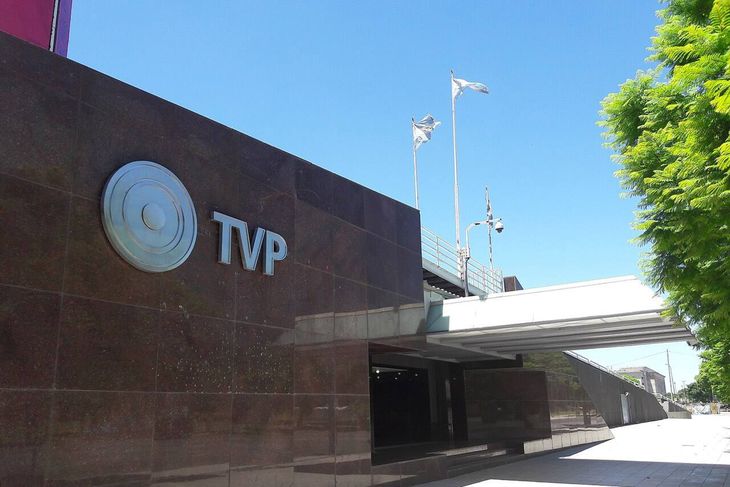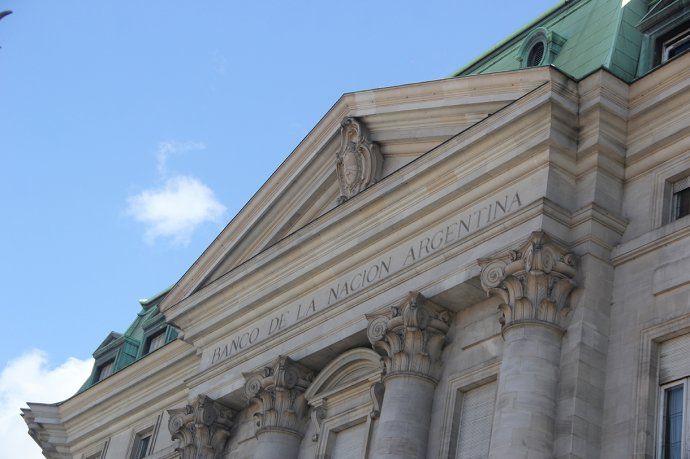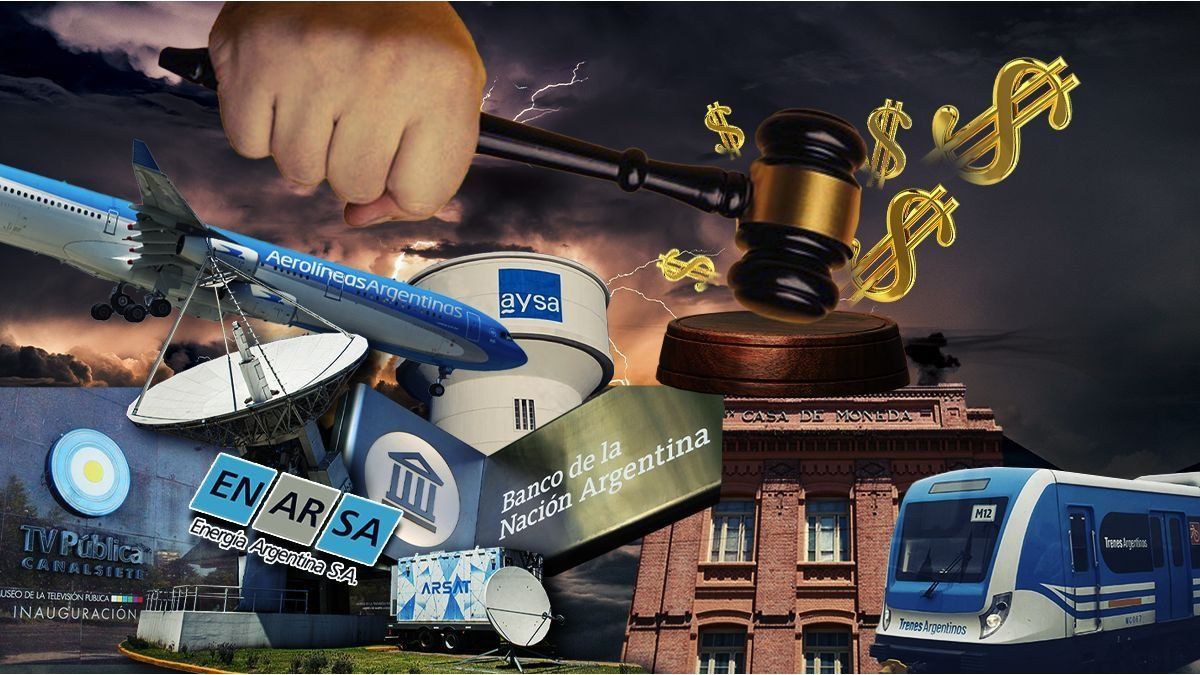In official media it is pointed out that, although there is Milei’s political decision to carry out the privatization process “as quickly as possible”, the task is not free of various difficulties. In this regard, they indicate that economic interests intersect with different levels of political decision-making. “There are many voices giving their opinion,” they point out. What’s more, there are those who consider that “it would be necessary to have a Roberto Dromi” in reference to who was the “privatization minister” of Carlos Menem’s government and who had great political support to promote privatizations.
Argentine Airlines airlines Aeroparque Planes
Aerolíneas Argentinas was already classified by decree as subject to privatization.
Mariano Fuchila
Those around the head of state assure that privatizations will close “a source of income for corrupt politicians.” The president considers that the transfer of companies currently managed by the public sector into private hands is a fundamental part of his fight “against the political caste.” What’s more, they explain in the presidential environment, “Even if the company has a surplus, it will still be transferred to the private sector because if it remained in the public sphere, corrupt politicians would make it deficient again.”
Currently, the companies under study are, among others, Aerolíneas Argentinas, Intercargo, General Administration of Ports, Road Concessions, half a dozen railway companies, ARSAT, ENARSA, IMPSA, Casa de la Moneda, the Nación, Hipotecario and BICE banks, Fabricaciones Militares, Tandanor, Aguas y Saneamiento (AySA) and public television.
The criteria used by the authorities in charge of the area goes beyond the simple privatization process. In a synthetic way, it aims to analyze the situation of each of these companies, see which segments have value and evaluate the best ways for these activities to move to the private sector.
public television.jpg

Public TV is another of the state companies in the crosshairs.
The Government contemplates six mechanisms to decide the fate of these companies:
- Privatization – IPO (initial public offering, process to raise funds through a stock market listing). It may be total or partial, sale of shares, capital increase, tender or public offer.
- Concession (companies or units)
- Transformation (asset splits, sale of expendable assets, transfer of non-strategic units).
- Transfer (to the provinces)
- Closure (operational closure, liquidation, merger by absorption)
- Strategic partners (associative contracts)
For now, the Agency is considering three stages in this process. One, identified as “Definition”, contemplates a period of 2 to 3 months in which the task consists of closing balance sheets, establishing the modalities for the privatization process, the business plan and the hiring of advisors.
The second, called “Preparation”, consists of advertising the call to interested parties, the presentation and evaluation of offers. Also in a period of 2 to 3 months.
The process ends with the “Execution” consisting of the Award Recommendation, the official opinions, the award and the attention to any possible challenges (1 to 2 months).
Banco Nación Argentina BNA

In the presidential environment he explains that “Even if the company has a surplus, it will still be transferred to the private sector because if it remained in the public sphere, corrupt politicians would make it deficient again.”
Ignacio Petunchi
Privatizations: the case by case of each company
The authorities are considering different alternatives adapted to each particular case to increase private presence in these companies.
AySA
One of the most important is AYSA. In official media it is considered that the priority is to summon “a strong operator” to take charge of the management of the company. In parallel, the possibility of opening the share capital to the stock market is being studied. It should be taken into account that the company has experience in the capital market (it has already issued negotiable bonds).
ARSAT
The state communications company ARSAT has already announced its listing on the stock market in 2025 with the purpose of privatizing up to 49% of the shareholding. Nucleoeléctrica Argentina SA, the Argentine electricity generating company that operates the Embalse and Atucha I and II nuclear power plants, could also go to the capital market.
Argentine Airlines
Official media assess that the privatization of Aerolíneas is not possible under current conditions, but they also point out that there are areas that could leave their orbit to reduce the size of the company and favor airline competition. In this sense, ground services, air services, simulators, OPTAR or part of the fleet are analyzed.
Immediately, they comment that there were conversations with the government of Córdoba because it had expressed interest in receiving the Embraer (Austral) fleet to set up a provincial airline, according to what they say in the Casa Rosada.
President Milei on more than one occasion stated that he would have no problem giving the company to the employees and, in the same sense, the Minister of Deregulation, Federico Sturzenegger, believes.
The Government states, meanwhile, that there will be no buyers of Airlines as long as the current labor agreements remain in force. For this reason, it emerged from union sources that they are holding conversations to see how to reformulate the agreements.
VENG
The division of business areas is also part of the official strategy. Thus, in the case of VENG, a high-value-added technological development and services company, with a specialty in space activity, they are thinking about splitting the satellite information business from access to space since it is considered that they obey market drivers. different and, therefore, a privatization with strategic buyers would be more convenient under these conditions. In this case, the province of Córdoba is also interested in receiving the satellite imaging business facilities, in conjunction with INVAP.
The same thing happens with the nuclear company Dioxitek since it is considered advisable to separate the nuclear fuel business from radioisotopes for medicinal use.
ENARSA
ENARSA has different business units related to hydroelectric, thermoelectric generation, gas pipelines and renewable energy (wind). The first evaluations contemplate that, depending on its situation, it should be concessioned, sold or closed, making their separation necessary.
Military Fabrications
The company’s core activity is linked to the provision of ammunition, vests and gunpowder/explosives. It turned out that there would be interests in exploiting the 4 main plants through the figure of an associative contract, but the legal figure has not yet been defined. The official evaluation is that assets related to other businesses should be sold or closed to ensure the sustainability of the company, among them the Capillitas Metallurgical Establishment and the San José de Jáchal Explosives Plant and the Córdoba Water Purification Plant.
Business transfers are also part of the official strategy. Thus, the transfer of responsibilities today by the National Mining Secretariat in the Dionisio Agua Mining Deposits to the Province of Catamarca and the National University of Tucumán is being negotiated.
Argentine aircraft factory
In the case of the Argentine Aircraft Factory, the transfer of the shares of the Ministry of Defense to the province of Córdoba is being negotiated. In the same sense, the transfer of the Capillita (rhodochrosite) mining concession to the province of Catamarca is being processed.
The objective of the national authorities is to transfer these assets to the provinces, but with the intention not for the subnational states to take charge, but for the governorates to facilitate privatization.
Banks
In terms of financial entities, the authorities are determined to sell the shares that the State still has in the Mortgage Bank and the official intention is also to get rid of the Investment and Foreign Trade Bank. As for the Banco de la Nación, the first step that is planned is to transform it into a public limited company and then try to inject private capital into it, including opening its capital to the stock market.
Source: Ambito
I am Pierce Boyd, a driven and ambitious professional working in the news industry. I have been writing for 24 Hours Worlds for over five years, specializing in sports section coverage. During my tenure at the publication, I have built an impressive portfolio of articles that has earned me a reputation as an experienced journalist and content creator.




